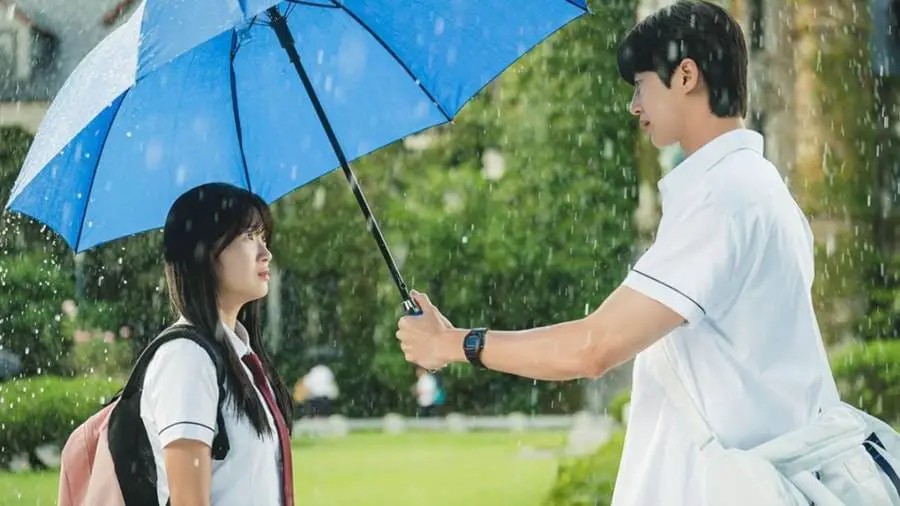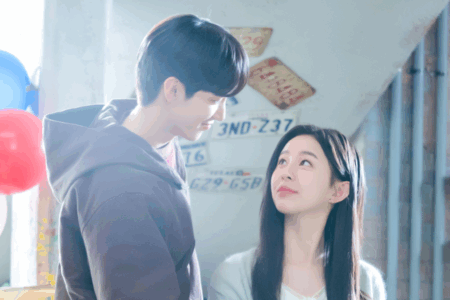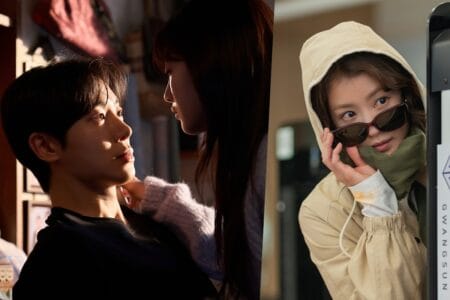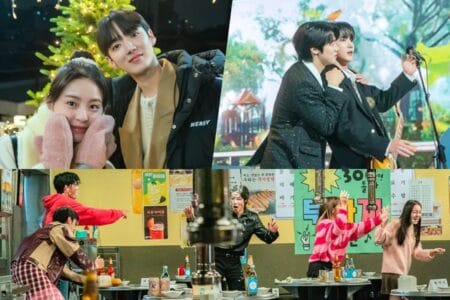Let’s be honest. The silence after the final credits of Lovely Runner is deafening, isn’t it?
You’ve just spent sixteen glorious, heart-stopping, tear-jerking hours watching Im Sol leap through time to save her ultimate bias, the luminous Ryu Sun-jae. You’ve ridden the dizzying highs of their fated romance and plunged into the gut-wrenching lows of every reset, every near-miss, every sacrifice. You’ve laughed at their teenage antics, swooned at their romantic confessions, and screamed at your screen every time that chillingly persistent villain appeared.
And now… it’s over.
You’re left with a Ryu Sun-jae-sized hole in your heart, a playlist of ECLIPSE songs on a permanent loop, and a lingering question: what on earth do you watch next? How can anything possibly compare to the perfect alchemy of nostalgia, high-stakes thriller, and epic, destined love that Lovely Runner delivered?
This is what we call the Post-Drama Slump (PDS), and a case this severe requires a very specific prescription. You don’t just need another romance; you need a story that understands the unique magic you just experienced. You need a drama that plays with the very fabric of time, that believes in the power of love to transcend destiny, and that offers a journey so compelling it can coax your heart out of hiding.
Fear not, fellow runner. We’ve curated a list of five exceptional time-travel K-dramas specifically designed to heal your post-Lovely Runner blues. Each one offers a different flavor of temporal shenanigans, but they all share that essential DNA: profound emotional depth, unforgettable characters, and the tantalizing question of “what if?”
So, grab your coziest blanket, brew some tea (or grab a soju, we don’t judge), and get ready to fall in love with time-travel all over again.
1. For the One Who Loved the Nostalgia, Music, and Found Family: Twinkling Watermelon (2023)
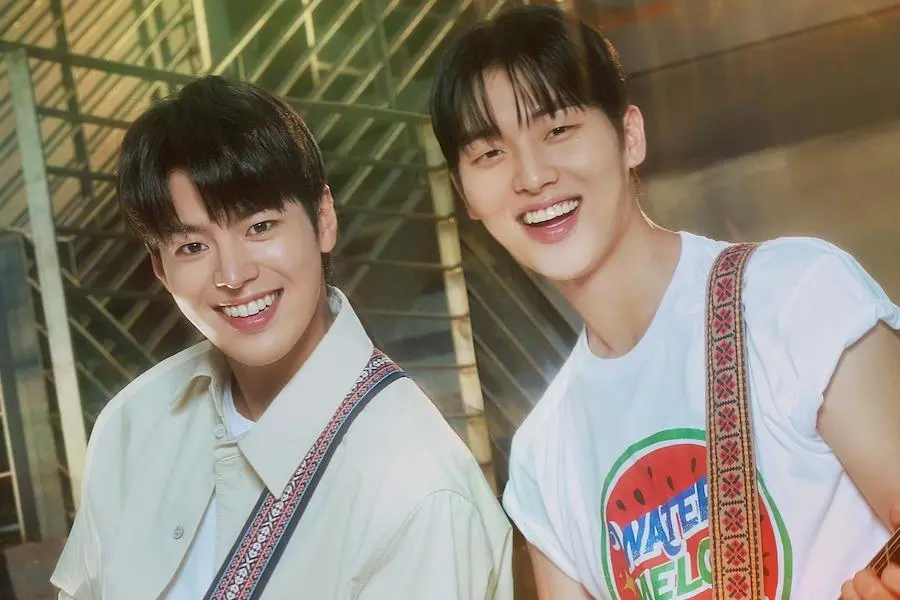
The Gist: Ha Eun-gyeol (Ryeoun) is a CODA (Child of Deaf Adults) and a musical prodigy, a secret he keeps from his loving but strict parents. One day, following a strange series of events at a mysterious music shop, he finds himself transported from 2023 back to 1995. There, he comes face-to-face with his own father, Ha Yi-chan (Choi Hyun-wook), as a hearing, carefree, and slightly goofy high school student. Realizing this is his one chance to understand his father and perhaps prevent the accident that cost him his hearing, Eun-gyeol joins his dad’s fledgling band, “Watermelon Sugar,” all while trying to navigate the past, play matchmaker for his future parents, and figure out how to get back home.
Why It’s a Lovely Runner Cure:
If Lovely Runner was a love letter to the early 2000s, Twinkling Watermelon is a vibrant, sun-drenched ode to the mid-90s. This drama is perhaps the most direct and perfect follow-up on this list. The parallels are so striking it almost feels like they were born from the same creative soul. You loved the music aspect of Lovely Runner with Sun-jae and ECLIPSE? Twinkling Watermelon is centered around the formation of a band, filled with incredible musical performances and a genuine passion for the craft. You adored the fierce, protective love that drove Im Sol to change the past? Eun-gyeol is driven by an equally powerful, albeit filial, love to protect his father’s future.
The Deep Dive:
A Different Kind of Protective Love: While Lovely Runner is a story of romantic destiny, Twinkling Watermelon explores the powerful, often unspoken, love between a child and a parent. Eun-gyeol’s mission isn’t to make his father fall in love with him, but to ensure his father gets to live the bright, sound-filled life he dreams of. This shift in focus from romantic to familial love is incredibly refreshing and deeply moving. We see Eun-gyeol look at his young, vibrant father not just as “Dad,” but as a young man with his own dreams, flaws, and first loves. It’s a poignant exploration of seeing our parents as the complex individuals they were before we existed. This protective instinct mirrors Im Sol’s desperation so beautifully, providing that same sense of high-stakes emotional investment.
The Power of Music and Communication: Music in Twinkling Watermelon isn’t just a backdrop; it’s the bridge between worlds. It’s the language that connects the hearing and deaf characters, the past and the present. The band practice scenes are electric with the raw energy of youth and discovery. The drama masterfully uses sign language and music as intertwined forms of communication, creating scenes of breathtaking emotional power. When characters communicate through a combination of spoken word, frantic signing, and the universal language of a guitar riff, it’s pure magic. This thematic depth will resonate strongly with anyone who felt the emotional weight of Sun-jae’s song “Sudden Shower.”
Nostalgia and Found Family: The 1995 setting is rendered with loving detail, from the baggy jeans and pagers to the optimistic, pre-internet era vibe. But the real heart of the show is the found family at its core. The bond between the members of the band “Watermelon Sugar” is the drama’s warm, beating heart. They bicker, they support each other, and they create something beautiful together. It’s a story about youth, friendship, and the irreplaceable bonds forged in the pursuit of a shared dream. This will fill the void left by the wonderful friendship between Sol, Sun-jae, and Tae-sung.
The Heart-Healing Factor: This show is pure serotonin. It’s funny, warm, and overwhelmingly optimistic. While it has its share of tear-jerking moments (prepare yourself), its prevailing message is one of hope, connection, and the dazzling brightness of youth. It will make you laugh out loud, cry cathartic tears, and leave you with a feeling of profound warmth. It’s the perfect, gentle landing after the emotional turbulence of Lovely Runner.
2. For the One Who Loved the Emotional Weight of Second Chances: Go Back Couple (2017)
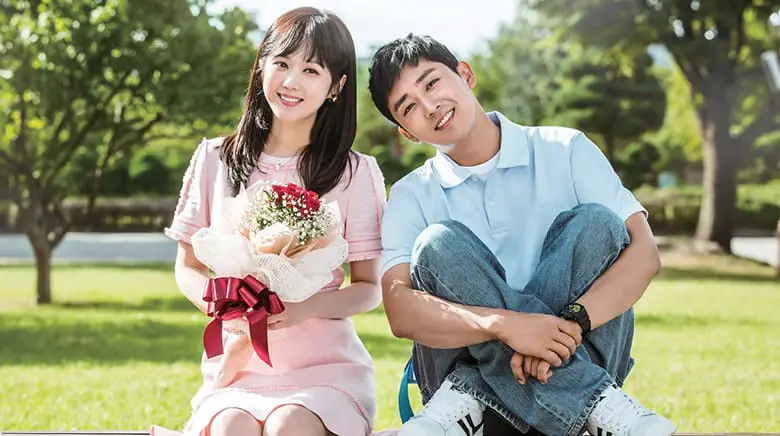
The Gist: Choi Ban-do (Son Ho-jun) and Ma Jin-joo (Jang Na-ra) are a married couple in their late 30s, utterly worn down by life, financial struggles, and years of accumulated misunderstandings. They are bitter, exhausted, and on the brink of divorce. On the very day they finalize their separation, they wake up to find they have been transported back 20 years, to 1999, when they were 20-year-old college students just about to meet for the first time. Given a second chance at their youth, they both decide to make different choices this time around, determined to avoid the future misery they just escaped. But as they relive their brightest days, they begin to see each other—and their past—in a completely new light.
Why It’s a Lovely Runner Cure:
Lovely Runner is about preventing a tragic future. Go Back Couple is about fixing a broken one. This drama takes the “time-travel for a second chance” trope and infuses it with a level of mature, grounded realism that is devastatingly effective. If you were captivated by the idea of hindsight and the desperate wish to do things differently, Go Back Couple will grab your heart and not let go. It tackles the same themes of fate and choice, but from the perspective of a love that has already been lived, and lost.
The Deep Dive:
The Pain of Regret and the Beauty of Rediscovery: This isn’t a story of starry-eyed first love. It’s about a love that has curdled. The first episode does a masterful job of showing us why Ban-do and Jin-joo have fallen apart. It’s not one big betrayal, but a death by a thousand cuts—unappreciated sacrifices, unspoken resentments, and the slow erosion of communication. When they go back in time, their initial goal is to escape each other. But by being young again, they are stripped of their adult baggage. They get to see the vibrant, hopeful people they once were, and the charming, wonderful person they once fell in love with. The journey of them rediscovering each other’s worth is one of the most satisfying character arcs in modern K-drama.
The Unspoken Star: A Mother’s Love: Prepare tissues, because this is where Go Back Couple truly transcends. In the present day, Jin-joo’s mother has passed away. When Jin-joo wakes up in 1999, the first thing she does is run to find her mother, alive and well. The scenes between Jin-joo and her young, healthy mom are the emotional core of the series. Jang Na-ra’s performance is nothing short of phenomenal as she portrays a daughter’s desperate, heart-wrenching love and a grief so profound it hurts to watch. She clings to her mother, cherishing every mundane moment—eating a meal, holding her hand, just being in her presence. It’s a powerful, universally relatable storyline that elevates the entire drama. If you cried for Sol’s relationship with her grandmother, this will emotionally wreck you in the best possible way.
Comedy as a Trojan Horse for Feels: Don’t be mistaken, this show is hilarious. The fish-out-of-water comedy of 38-year-old minds in 20-year-old bodies is executed perfectly. They know which historical events are coming, they struggle with their youthful stamina, and they have to pretend they don’t know each other. The campus scenes are light, funny, and full of 90s nostalgia. But the comedy serves a deeper purpose: it makes the moments of dramatic heartbreak hit that much harder. The show expertly balances laughter and tears, creating a rich, textured viewing experience.
The Heart-Healing Factor: Go Back Couple heals by teaching. It’s a profound meditation on marriage, sacrifice, communication, and the importance of not taking your loved ones for granted. It argues that the “happily ever after” isn’t the wedding, but the daily, conscious choice to love and appreciate someone. The ending is deeply cathartic and earned, leaving you with a renewed sense of gratitude for the people in your own life. It’s a mature, wise, and ultimately hopeful story that will piece your heart back together, but make it wiser in the process.
3. For the One Who Craved the Intricate Plot and Soul-Stirring Angst: Someday or One Day (2019) (The Original Taiwanese Masterpiece)
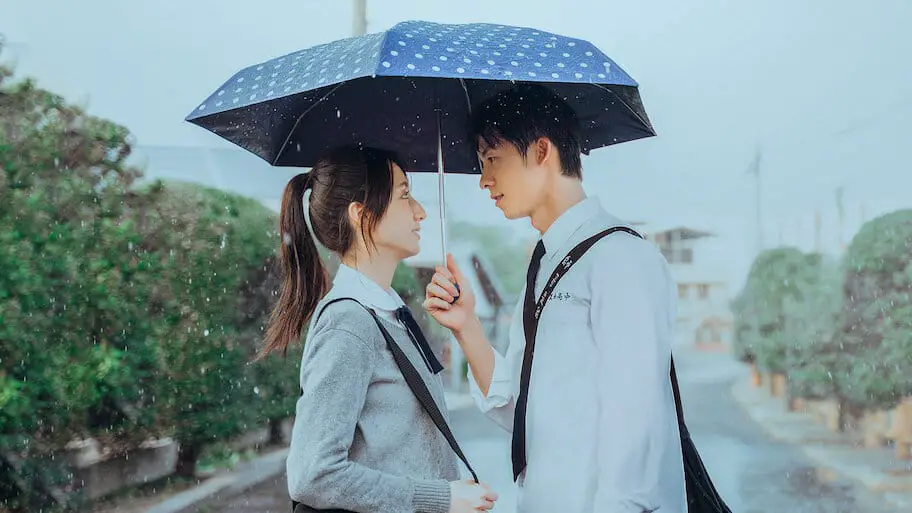
The Gist: In 2019, a grieving woman named Huang Yu-hsuan (Alice Ke) is still struggling to move on from the death of her long-time boyfriend, Wang Chuan-sheng (Greg Hsu), two years prior. One day, she receives a mysterious package containing a portable cassette player and a tape by an old band. Listening to the music, she falls asleep on a bus and wakes up to find she is no longer herself. She is in 1998, inhabiting the body of a high school student named Chen Yun-ru, a quiet, withdrawn girl who looks exactly like her. To her shock, she discovers that one of Yun-ru’s classmates, the cheerful and charismatic Li Zi-wei, is the spitting image of her deceased boyfriend. As Yu-hsuan tries to unravel the mystery of how she time-traveled, who Chen Yun-ru is, and what Li Zi-wei’s connection is to her beloved Chuan-sheng, she gets pulled into a complex, tragic, and mind-bending love story that spans decades.
Why It’s a Lovely Runner Cure:
Okay, a small disclaimer: this is a Taiwanese drama. But its influence and quality are so immense (it was remade in Korea as A Time Called You), and its themes align so perfectly with the best parts of Lovely Runner, that it is an essential watch. If you were obsessed with the intricate, non-linear timeline of Lovely Runner, the feeling that every small action could have massive repercussions, and the sheer, breathtaking angst of a love fighting against a cruel fate, then Someday or One Day is your holy grail. It takes those elements and dials them up to eleven.
The Deep Dive:
A Masterclass in Complex Storytelling: Be warned: this is not a drama to have on in the background. It demands your full attention. The plot is a beautifully constructed puzzle box of intersecting timelines, dual identities, and causal loops. The show trusts its audience to keep up, slowly revealing pieces of the mystery until the full, devastating picture becomes clear. The “aha!” moments are frequent and incredibly satisfying. Much like Lovely Runner, it combines its central romance with a gripping thriller/mystery element that keeps you on the edge of your seat. Unraveling the “how” and “why” of the time travel is just as compelling as the romance itself.
Astounding Performances and Unforgettable Characters: The three leads deliver some of the best performances you will ever see in a drama. Alice Ke plays two distinct characters—the confident, modern Yu-hsuan and the painfully shy Yun-ru—often within the same scene, and the difference is staggering. Greg Hsu, much like Byeon Woo-seok, becomes a star with his portrayal of both the sunny, boyish Li Zi-wei and the melancholic, devoted Wang Chuan-sheng. The chemistry between the leads is electric, palpable, and forms the unshakable core of the show. You will believe in their love, a love so powerful it literally breaks time to find its way back to itself.
Thematically Rich and Emotionally Devastating: Someday or One Day delves into incredibly deep themes: identity, self-worth, grief, loneliness, and the struggle to be seen for who you truly are. The story of Chen Yun-ru, the girl whose body is inhabited, is a tragic and compassionate look at teenage depression and the desire to disappear. The drama doesn’t shy away from the darker aspects of its premise, making its moments of light and love shine all the brighter. And the music! The central song, “Last Dance” by Wu Bai, functions exactly like “Sudden Shower” does in Lovely Runner—it’s the trigger for time travel, a symbol of the romance, and a haunting melody that will stay with you forever.
The Heart-Healing Factor: This might sound counterintuitive, as this show will absolutely break your heart. It will make you weep. But it’s a good kind of heartbreak—the kind that comes from experiencing a story so beautifully and profoundly told that it feels real. The healing comes from the catharsis. It’s a story that affirms that even in the face of immense tragedy and impossible odds, love is a force worth fighting for. The ending is bittersweet, poignant, and ultimately, perfect for the story it tells. It will leave you emotionally exhausted but artistically fulfilled, which is its own special kind of healing.
4. For the One Who Needs a Dose of Laugh-Out-Loud Comedy with a Surprise Dash of Romance: Mr. Queen (2020)

The Gist: Jang Bong-hwan (Choi Jin-hyuk) is a successful, arrogant, and womanizing chef working at the Blue House in modern-day Seoul. After a freak accident, he wakes up to find his soul has been transported back in time to the Joseon era… and is trapped inside the body of the young Queen Cheorin (Shin Hye-sun). Now, “she” must navigate the treacherous politics of the royal court, deal with her seemingly placid but secretive husband, King Cheoljong (Kim Jung-hyun), and try to survive long enough to find a way back to his own body and time—all while introducing modern slang, skincare routines, and instant ramen to the palace.
Why It’s a Lovely Runner Cure:
After the emotional wringer of Lovely Runner, sometimes the best medicine is a hearty, uncomplicated laugh. Mr. Queen is the perfect palette cleanser. While it’s a time-travel drama, its primary genre is comedy, and it is one of the funniest K-dramas ever made. It provides the same “fish out of water in a different time period” element but uses it for pure comedic gold rather than angsty romance. It’s the perfect show to watch when you just want to turn your brain off and smile.
The Deep Dive:
Shin Hye-sun’s Comedic Tour de Force: This show rests on the incomparable shoulders of Shin Hye-sun, and she delivers a performance for the ages. She perfectly embodies the swagger, vulgarity, and frantic energy of a modern man trapped in a queen’s body. The physical comedy is brilliant—the way she walks with a masculine gait in a hanbok, her unladylike expressions, and her constant inner monologues of disbelief and frustration. She is an absolute force of nature, and you will be in stitches from the very first episode.
A Surprisingly Sweet and Unconventional Romance: You might not expect it, but a genuinely compelling romance blossoms amidst the chaos. King Cheoljong is initially intrigued and bewildered by his “new” queen’s bizarre behavior. He sees past the demure facade she’s supposed to have and is drawn to her spirit, her strange wisdom (which is just modern common sense), and her unexpected loyalty. Their relationship develops from suspicion to a bizarre camaraderie, and finally, to a deep and touching affection. It’s a romance that defies gender and convention, and its slow-burn development is surprisingly swoon-worthy.
Historical Setting with a Modern Twist: While the show is set during a specific period of Korean history and involves real historical figures, it plays fast and loose with the details for comedic effect. The joy is in the clash of cultures. Watching the Queen teach the royal chefs how to make “ramyeon” using hand-pulled noodles, create the first delivery service in Joseon, or apply “mask packs” is endlessly entertaining. The palace intrigue and political plotting provide a solid narrative backbone, but it’s always secondary to the hilarious antics of our protagonist.
The Heart-Healing Factor: Laughter. Pure, unadulterated, side-splitting laughter. This show is a balm for a weary soul. It’s clever, irreverent, and full of heart. It doesn’t take itself too seriously, and it invites you to do the same. Watching Mr. Queen is like hanging out with your funniest friend. It will lift your spirits, make you forget your PDS, and remind you that sometimes, the best way to heal is just to have a good laugh.
5. For the One Who Loved the High-Stakes Thriller and Fateful Connection: Signal (2016)
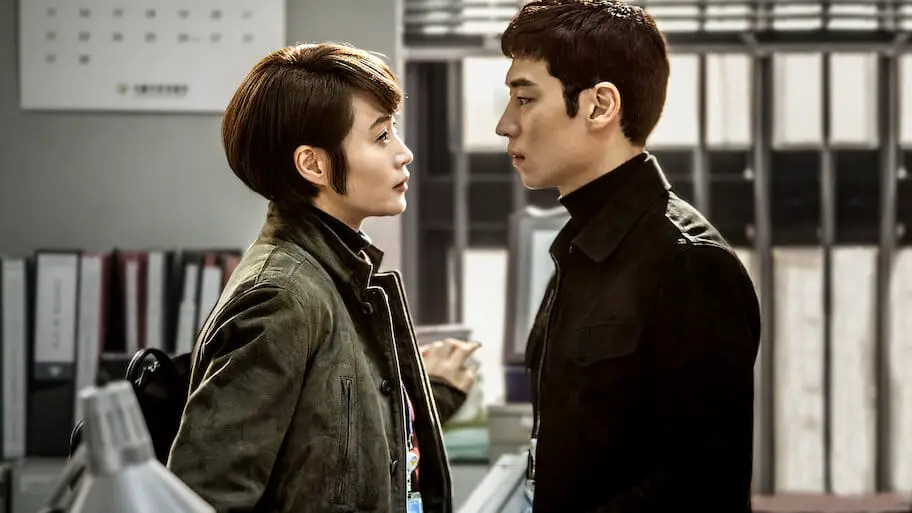
The Gist: In 2015, Park Hae-young (Lee Je-hoon) is a brilliant criminal profiler who distrusts the police due to a traumatic childhood experience. One day, he discovers an old walkie-talkie that crackles to life. On the other end is Lee Jae-han (Cho Jin-woong), an earnest, incorruptible, and slightly clumsy detective… from the year 2000. Through brief transmissions that only last a few minutes each night, the two men start working together across time to solve cold cases—cases that were Jae-han’s present and are Hae-young’s painful past. But they soon learn that changing the past has unforeseen and often tragic consequences for the present.
Why It’s a Lovely Runner Cure:
This final recommendation is for the viewer whose favorite parts of Lovely Runner were the pulse-pounding suspense and the chilling tension. While Signal is not a romance, it is arguably one of the greatest time-travel stories ever told in any medium. It captures the same desperate feeling of racing against the clock to prevent tragedy and the “butterfly effect” where one small change can alter everything. The emotional connection between the two male leads, forged across a 15-year gap, is every bit as powerful and fateful as a romantic one.
The Deep Dive:
Masterful Crime Procedural: Each cold case the detectives tackle is inspired by real-life crimes in South Korea, lending the show a chilling sense of realism and gravity. The writing is incredibly tight, intelligent, and respectful of its audience. The way the two detectives share information—Jae-han providing on-the-ground details from the past, Hae-young providing modern profiling insights—is a brilliant narrative device that keeps the pacing taut and the mysteries compelling.
The Consequences of Time: Signal is a masterclass in exploring the moral and practical ramifications of changing the past. This isn’t like Lovely Runner where the goal is a “perfect” timeline. Here, every “win” comes with a cost. Saving one victim might lead to another’s death. Exposing a killer early might erase the evidence needed to convict them in the future. The show is a constant, stressful negotiation with fate, and it never gives you easy answers. This constant tension and the high stakes will feel familiar and exhilarating to any Lovely Runner fan.
An Unforgettable Bromance: The heart and soul of Signal is the relationship between Hae-young and Jae-han. They never meet. They only have their voices. But through these crackling transmissions, they develop a profound respect, trust, and bond. Jae-han becomes the righteous mentor Hae-young never had, and Hae-young becomes the validation that Jae-han’s unwavering fight for justice wasn’t in vain. Cho Jin-woong’s portrayal of the passionate, lionhearted Detective Lee Jae-han is an all-time great performance. You will be rooting for him with the same fervor you rooted for Sun-jae.
The Heart-Healing Factor: Signal heals through sheer, unadulterated excellence. It’s a show so well-crafted, so intelligently written, and so powerfully acted that it will completely absorb you. It replaces the ache of a finished drama with the thrill of a new obsession. The healing comes from the profound sense of justice and hope it champions, even in the face of corruption and tragedy. It’s a story that believes in the power of good people to make a difference, no matter the odds. It’s a different kind of healing—one that engages your mind as much as your heart and leaves you in awe of the power of great storytelling.
The Journey Continues
Finishing a drama as special as Lovely Runner feels like a genuine loss. It’s a testament to the power of storytelling, the magic of on-screen chemistry, and the universal desire to protect the ones we love. But the beauty of the K-drama world is that there is always another story waiting to capture your imagination.
Whether you choose to dive into the warm, nostalgic music of Twinkling Watermelon, the mature emotional lessons of Go Back Couple, the mind-bending angst of Someday or One Day, the hilarious chaos of Mr. Queen, or the gripping suspense of Signal, you are embarking on a new journey.
Nothing will ever be exactly like your first run with Sol and Sun-jae, but these dramas promise to fill that void with their own unique magic. They will make you think, feel, laugh, and cry. They will heal your heart, not by replacing a beloved story, but by showing you that your heart has room for many, many more.
Happy watching.




